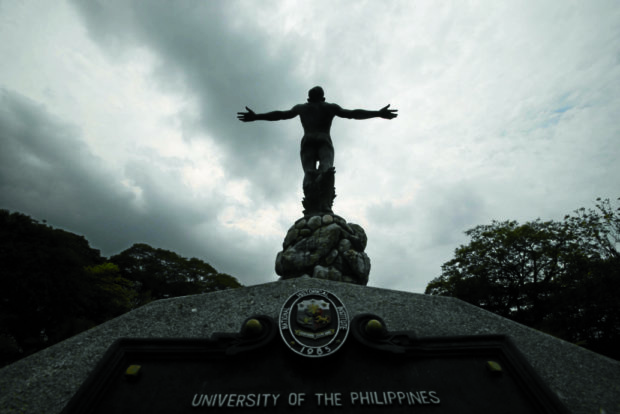UP adjusting fee collection due to ‘complicated’ situation

University of the Philippines Oblation statue at UP Diliman in Quezon City.
INQUIRER PHOTO / EDWIN BACASMAS
The chancellor of the University of the Philippines (UP) Diliman campus said on Thursday that the decision to suspend the collection of registration fees for the coming school year was due to a “complicated” situation, in line with recent developments in higher education institutions.
Chancellor Michael Tan said the suspension came pending a clearer government plan on the issue of fee collection in state universities and colleges (SUCs).
In an interview, Tan said the freezing of tuition collection was not unique to UP Diliman given the subsidy scheme provided by the Commission on Higher Education (Ched) on free tuition.
“This is what all the other state universities and (colleges) did because how the subsidy system works is that you don’t collect, then you report to Ched the cost of the foregone tuition fee,” he said.
READ: UP Diliman suspends collection of tuition
In April, Ched and the Department of Budget and Management (DBM) released an joint memorandum that outlined the guidelines of the implementation of the free tuition scheme wherein a total budget of P8 billion was allocated.
A total of P367.8 million was allocated to the UP system, which is composed of eight constituent units in 17 campuses nationwide.
However, Tan said this fund would not be enough to cover all students of the university system.
“The P183 million per semester might be inadequate,” he said. He also noted that the grant “is limited to tuition fees alone, meaning even the poorest students will still have to pay miscellaneous fees.”
He also noted that the application for the Ched subsidy required documents that students from the poorer sectors might not easily comply with, such as the income tax returns (ITR) of their parents.
“If your parents have no ITRs, which happens to the poor, the process can be tedious,” he said.
READ: ‘Free tuition won’t benefit the poor’
Jose Dalisay Jr., vice president for public affairs of the UP system, said the figure submitted to DBM was based on “estimates of tuition income” which were submitted by the university’s constituent units.
“We actually don’t know yet for sure if there will be a shortfall because the applications are still coming in,” he said.
As of Tuesday, at least 10,000 UP students have applied for the CHEd subsidy, said Tan.
“Hopefully by next week, we will have a complete record on how many have applied for the subsidy and if the allocated fund would be sufficient to cover them all,” he said, adding that the university was also eyeing to apply for supplemental budget from DBM in the event that the allocation would not be enough.
Meanwhile, at least 9,000 students have applied for the socialized tuition scheme of the university, which provides “tuition discounts” based on the paying capacity of the students’ family.
Tan said the decision was also a lesson learned from another SUC, which he refused to name, that was forced to undergo a refund process after it had already collected fees from the students, just before the Ched-DBM memo.
The chancellor also highlighted that the developments in the pending bill known as the “Universal Access to Quality Tertiary Education Act” also complicate the situation. The bill, which was already approved by Congress and is awaiting President Rodrigo Duterte’s signature, would remove all kinds of fees in higher education institutions.
“If the bill is not approved, we will be collecting miscellaneous fees later,” Tan said. “We are using more of a wait-and-see ‘method’… but we plan to suspend [collection] for as long as possible.”/rga